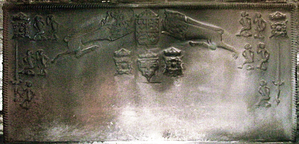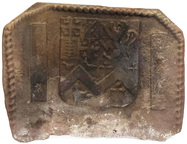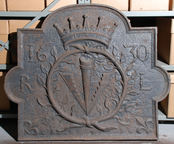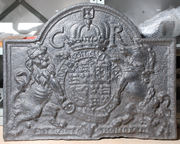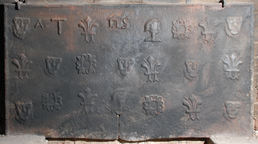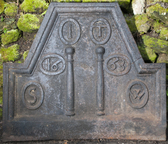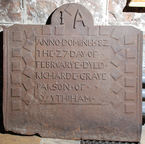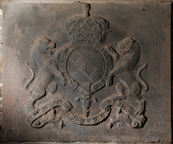-
595
Description: Rectangular; twisted rope edging (top and sides); top centre; crowned Tudor royal shield with angled lion passant guardant sinister to the left, and an angled lion passant to the right; below, a crowned shield with a fleur-de-lys below initials (over-pressed), between two four-petalled, crowned roses; the same crowned rose repeated in each top corner, below each a vertical dagger, point upwards; inside the roses and daggers, two tiered pairs of ‘imp’ figures, one of each with arm raised, above a single figure, its arms lowered.
Notes: Each dagger, which is seen on two other firebacks (no. 660 and no. 1100), is approx. 35cm long.
Copies of this fireback are known.
Inscription: KH
Arms: Tudor royal arms of England
- Decoration tags:
- rectangular (shape)
- rope (edging)
- carved stamps
- heraldic
- armorial
- royal
- animals
- humans
Manufactured: in the mid-16th century in the Weald area of England.
Current location: in private hands, Wigmore, Herefordshire, England.
- Attached to series:
- Royal series
- Knife & Dagger stamp firebacks
-
1305
Description: Quasi-rectangular with canted top corners; twisted rope edging (top and sides); centre top, quartered shield between two vertical carved stamps of a billet with five oval shapes.
Notes: The arms are probably of Thomas Wriothesley, who was Henry VIII's last Lord Chancellor and created Earl of Southampton in 1547; he married c.1533 so the arms could date to before then, but the same arms are displayed on his enamelled stall plate in St George's Chapel, Windsor, of 1545, and in stained glass in a window in the parish church at South Warnborough, Hampshire. The shield is, quarterly, 1. Wrythe or Wriothesley quartering Dunstanville and Pink, 2. Drayton, 3. Crocker and 4. Peckham. A candidate for the earliest English fireback with an example of personal arms. It is possible that this casting is the one formerly at Warnham Court, Sussex, which was illustrated by J. Starkie Gardner in Country Life in 1907. A similar fireback is no. 334. William Smith Auctions, Plainfield, NH, 20 Nov 2024, lot 424 ($250).
Arms: Wriothesley (Earl of Southampton)
- Decoration tags:
- rectangular with canted top corners (shape)
- simple stamps
- carved stamps
- heraldic
- armorial
- objects
Manufactured: in the mid- to late-16th century in the Weald area of England.
Current location: not known.
Citation: Gardner, J. S., 25 May 1907, 'Old Wealden Ironwork at Warnham Court', Country Life, pp. 730-2.
- Attached to series:
- Wriothesley firebacks
- Royal series
- Personal armorial firebacks
-
588
Description: Arched rectangular shape with semi-circular protrusions at the sides; cavetto-moulded edging; a pheon (a downward-pointing arrow head barbed on the inner edge) within a wreath, an earl’s coronet above; the date on either side of the coronet; the initials on left and right sides; a fleur de lys in each bottom corner.
Notes: The detail of the wreath differs from that on the 1626 plate.
Copies of this fireback are known.
Inscription: 16 30 / R L
- Decoration tags:
- rectangular with round arch (shape)
- cavetto (edging)
- whole carved pattern
- heraldic
- text
- objects
Manufactured: in 1630 possibly at Robertsbridge Furnace, Salehurst in the Weald area of England.
Current location: Winchester Museums Store, Unit F2, Bar End Industrial Estate, Winchester, Hampshire, Winchester, Hampshire, England.
Museum number: WINCM:LH 5704 (part of the Winchester Museums museum group)
- Attached to series:
- Earl of Leicester series
- Personal firebacks
-
795
Description: Arched rectangular shape; cavetto-moulded edging; English royal Stuart shield, garter, crown, supporters and motto; initials split by crown.
Notes: The arches of the crown are not typically English in form, suggesting a possibly continental pattern-maker.
Inscription: C R / HONI SOIT QVI MAL ...PEN...
Arms: English Stuart royal
- Decoration tags:
- rectangular with round arch (shape)
- cavetto (edging)
- whole carved pattern
- armorial
- royal
- text
Manufactured: in the 17th century possibly in the Weald area of England.
Current location: Winchester Museums Store, Unit F2, Bar End Industrial Estate, Winchester, Hampshire, Winchester, Hampshire, England.
Museum number: WINCM:LH 3737 (part of the Winchester Museums museum group)
-
962
Description: Arched rectangular shape; ovolo moulded edging; Tudor royal shield, garter, crown, motto and supporters (crowned lion and dragon); plain panels at sides and bottom.
Notes: A common variant has a rose and portcullis either side of the crown, and the top of the lion's crown and the dragon's ear do not overlap the edging; without the extension panels, the approximate dimensions of the main plate are 805mm wide by 590 high. The quality of the relief indicates that this composite fireback was created using an early casting of the armorial back.
Inscription: [Garter] HONI SOIT QVI MAL E PENSE / [motto] DIEV ET MON DROIT
Arms: Tudor royal
- Decoration tags:
- rectangular with round arch (shape)
- rope and wood moulding (edging)
- whole carved pattern
- composite
- planklines
- extension panels
- armorial
Manufactured: in the mid- to late-16th century in the Weald area of England.
Current location: in private hands, Wisborough Green, West Sussex, England.
-
797
Description: Rectangular; twisted rope edging (top and sides); three impressions of an ornate firedog, each incorporating lion’s legs, above it a pedestal with a lion’s head, surmounted by a caryatid, a shield shaped cartouche over its lower trunk, and with a floral vase headdress. The dog impressions are not evenly stamped, the middle one lying to the right.
Notes: The firedogs are much more elaborate than those customarily used as stamps on firebacks and indicate a later date; they probably included brass elements and were possibly French.
- Decoration tags:
- rectangular (shape)
- rope (edging)
- simple stamps
- objects
Manufactured: in the late-16th to early-17th century in the Weald area of England.
Current location: in private hands, Wisborough Green, West Sussex, England.
- Attached to series:
- Firedog stamp firebacks
- Metalware stamp firebacks
-
801
Description: Rectangular; twisted rope edging (top and sides); irregular arrangement of four stamps in three rows: face mask with ruff (7), flower head with four petals and leaflets (4), fleur-de-lys (7), and profile of head with ‘Roman’ crest (2); initials replace stamps top left and centre.
Notes: A smaller, dated variant is at Godolphin House, Helston.
Copies of this fireback are known.
Inscription: AT nS
- Decoration tags:
- rectangular (shape)
- rope (edging)
- carved stamps
- individual letters
- heraldic
- text
- humans
- plants
Manufactured: in the early-17th century in the Weald area of England.
Current location: The Dorset Arms, Withyham, East Sussex, England.
Citation: Lloyd, N., 1925, 'Domestic Ironwork I', Architectural Review, 58, pp. 58-67.
- Attached to series:
- Primitive stamp series
-
1061
Description: Triple-facetted arched rectangular shape; ovolo-moulded edging (top and sides); bottom centre, a vertical distaff or spindle repeated twice; to each side a fillet-edged oval containing the initials S and W; above, either side of the distaffs, two more ovals perpendicular to the first two, with the date split between them; above each distaff, an oval rotated as at the bottom, the initials I T split between them; at the base, a blank rectangular panel.
Notes: An unusual shaped fireback. It was recorded by J. Starkie Gardner in one of his scrapbooks (Victoria and Albert Museum, Archive of Art and Design (AAD/2014/8)), marked '[?]Warris Westerham Kent'; subsequently it was at Skipreed, Chiddingstone Hoath, Kent.
Inscription: I T / 16 63 / S W
- Decoration tags:
- rectangular with triple-facetted arch (shape)
- ovolo (edging)
- carved stamps
- text
- objects
Manufactured: in 1663 possibly in the Weald area of England.
Current location: not known.
- Attached to series:
- Miscellaneous stamp firebacks
- Spindle/distaff firebacks
-
798
Description: Arched rectangular shape with canted top corners; astragal-and-fillet and cavetto moulded strip on each side, angled at top; raised central square panel bearing main inscription in sans-serif characters justified to left (2s formed like Zs); irregular arrangement of small ‘serrated’ square stamps repeated 29 times in two vertical groups of 12 on each side of the inscription panel (6 on the outside, side to side, 6 on the inside, roughly corner to corner); 2 squares, side to side, below each side of the arch, above the inscription panel; 1 square at top of arch between non-matching initials.
Notes: The inscription is the same as on the iron plate above the grave of Richard Gray in Withyham church; another fireback, said to have the same inscription, was formerly at Wolvesey Palace, Winchester, and later in Winchester Museum, but is now missing; the moulding strips are likely to have been derived from furniture. Frances Ashbie and Richard Graye's godson, Richard, the son of William Ashbie, were among the beneficiaries of Richard Graye's will and the initials, IA, on the fireback may relate to another member of that family. The fireback was noted at Sompting, near Lancing, West Sussex, in the 1820s.
Inscription: I A / ANNO·DOMINI·1582 / THE·27·DAY·OF·· / FEBRVARYE·DYED· / RICHARDE·GRAYE / PARSON·OF· · / WYTHIHAM·
- Decoration tags:
- rectangular with round arch (shape)
- complex, furniture-derived (edging)
- carved stamps
- carved pattern panels
- individual letters
- text
Manufactured: in 1582 probably at Hamsell Furnace, Rotherfield in the Weald area of England.
Current location: St Michael's church, Withyham, East Sussex, England.
Citation: Arnold, F., 1871, 'Withyham Monumental Slab', Sussex Archaeological Collections, 23, pp. 320-1.
- Attached to series:
- Richard Graye inscription series
- Epitaph firebacks
-
799
Description: Rectangular; plain plate with shield, supporters, ducal coronet, motto and garter of the Duke of Dorset: Quarterly, Or and gules, a bend vair.
Notes: Almost certainly the arms of Lionel Sackville KG (1688-1765), created first duke of Dorset in 1720; many different firebacks exist, all with precisely the same armorial stamp.
Copies of this fireback are known.
Inscription: [around shield] HONY SOIT QUI MAL Y PENSE / [on motto scroll] AUT NUNQUAM TENTES, AUT PERFICE
Arms: Lionel Sackville, 1st Duke of Dorset
- Decoration tags:
- rectangular (shape)
- none (edging)
- carved stamps
- armorial
- text
Manufactured: in the early-18th century in the Weald area of England.
Current location: in private hands, Withyham, East Sussex, England.
- Attached to series:
- Dorset arms series
- Sackville firebacks
- Personal armorial firebacks
